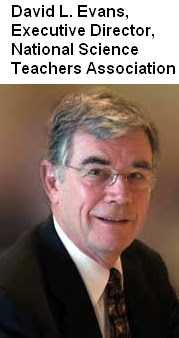David Evans1 is the Executive Director of NSTA and he has written about the recent attempts to insert creationism into textbooks in Texas [In Texas, Standing Up for Science]. He says one very good thing in these two paragraphs.
There are many ways that humans come to know, experience, understand and appreciate the world in which we live. Consider, for example, the different realms of religion, science and art. We can all appreciate the beauty of a sunset without understanding that its beauty comes from the energy of a thermonuclear reaction and the refraction of its light in the atmosphere. Likewise, understanding the scientific processes of the sunset does not prevent one from capturing its beauty on canvas or making a spiritual connection.I like the way he expresses the idea that we "must teach what the vast majority of scientists affirm as settled science." This avoids getting into definitions about what counts as science. It avoids the "methodological naturalism" trap. Well done!
There are countless differing opinions about how best to educate our children, but presenting non-scientific or religious ideas in science class or in science textbooks is simply wrong and blurs the line about what is and what is not science. This will only confuse and mislead students and does nothing to improve the quality of science education and everything to weaken it. Decisions about what counts as science should not be a popularity contest. No matter how many people object, public schools must teach what the vast majority of scientists affirm as settled science.
The next paragraph isn't quite as good. It could have been a lot better. All he had to do was leave out the little phrase that I underline and enclose in brackets. It would not change the meaning but it would properly reflect "what the vast majority of scientists accept as settled science."
Texas students deserve the best science education possible, as do students everywhere. This means teaching them sound science, including evolution [by natural selection] as a major unifying concept in science. It is firmly established as one of the most important and robust principles in science, and is the best and most complete scientific explanation we have for how life on Earth has changed and continues to change. Furthermore, the very foundation of science is grounded in, and based upon, evidence. Classrooms will use the textbooks Texas adopts for years (the last science textbook adoption was a decade ago). Compromising the integrity of science for a whole generation of students to satisfy a few vocal ideologues is simply not acceptable.
1. From the website: "Evans holds a Ph.D. in oceanography from the University of Rhode Island and a bachelor’s degree in mathematics from the University of Pennsylvania. He studied for his teaching certification at Villanova University."

No comments:
Post a Comment